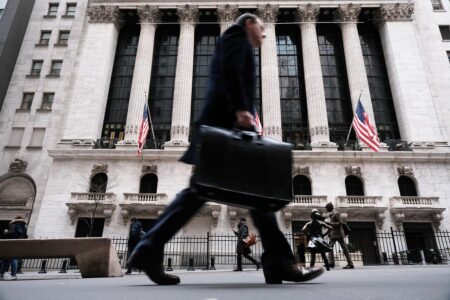What did you do last week? Sorry to be so blunt, but federal workers are grappling with that question. DOGE sent an email this weekend asking government employees to list their recent accomplishments before midnight tonight. Many told BI they feel frustrated by the request. The Department of Defense, meanwhile, instructed staff not to respond.
In today’s big story, getting an advanced degree was once viewed as the best path toward job security. Now, it’s proving to be a liability on your résumé.
What’s on deck
Markets: The takeaways from Warren Buffett’s annual letter to Berkshire Hathaway shareholders.
Tech: A former big-time Elon Musk believer makes the case for why Tesla is in trouble this year.
Business: The Russian media oligarch pushing Putin to even further extremes.
But first, school’s out forever.
If this was forwarded to you, sign up here.
The big story
Highly educated, highly unemployable
Their degrees were something for them to fall back on. Instead, they’re in a free fall.
Job seekers with advanced degrees are having a much harder time finding work compared to their less-educated peers, writes Business Insider’s Aki Ito.
These days, you’re better off with just a high school diploma instead of a Ph.D. if you want to find work fast. People who didn’t go to college can get work twice as quickly as those with advanced degrees.
(Let’s be clear: Advanced-degree holders still largely rule the roost on compensation. But pay only matters once you have a job.)
Aki has previously written about the struggles of white-collar workers thanks to hiring reductions among tech and finance firms. Those are common landing spots for people with advanced degrees, which might be why extra education isn’t paying off in the job hunt.
However, Aki’s story explores whether the labor market’s latest shift could signal a bigger change in the importance of education.
All of this is also happening at a time when colleges are facing a reckoning.
Some say you can’t put a price on education, but universities have certainly tried. With the cost of a four-year degree at a private college easily surpassing $250,000, more and more young people are questioning the benefits of college, let alone grad school.
Another corner of the job market that was once a sure thing is also getting shaken up.
Government jobs, traditionally considered a stable paycheck with good benefits, have been upended by the Trump administration. (Just reread the intro to this newsletter if you need a recent example.)
Tens of thousands of employees took buyouts, and thousands of probationary workers were fired during the first month of the Department of Government Efficiency’s cost-cutting efforts.It’s still unclear the impact these job cuts will have on the wider labor market. But continuing to make wholesale changes to the largest employer in the US, which is known for its job security, will likely have some residual effect.
News brief
3 things in markets
1. Warren Buffett’s tax bill was a doozy. Berkshire Hathaway, the legendary investor’s conglomerate, paid a record $26.8 billion in taxes last year, Buffett wrote in his annual letter to shareholders. It’s the most paid by any US company in history and represents about 5% of total American corporate income taxes paid in 2024. “Spend it wisely,” Buffett wrote. The letter also included some more fundamental business — and life — lessons, too.
2. The meme coin explosion. Once an obscure corner of crypto, meme coins have taken on a life — and market — of their own. But scams are common with meme coins, and ongoing conversations about a regulatory path are another big question mark.
3. How a hedge fund repays $1.2 billion to investors heading for the exits. The past few years have been rocky for Paloma Partners, posting just a 2.5% return in 2024. The multistrategy hedge fund said last fall it would take time to repay departing investors. To meet redemption requests, Paloma plans to pull $600 million from hedge funds it backed, including the quant firm Aquatic Capital, according to four people familiar with the matter.
3 things in tech
1. An early Tesla investor is now bearish on the stock. Ross Gerber was among the first to spot Tesla’s potential, but he isn’t feeling so confident now. Gerber doubts the company can achieve Full Self-Driving on time without switching hardware, and he believes Elon Musk has too many pots in the fire.
2. We’re hiring … just not humans. Originally created as an experiment, two founders built a jobs board for AI agents. The jobs board, dubbed “Job for Agent,” provides insight into what companies might look for in an AI workforce.
3. AI bosses feel the pressure. In a recent interview, the CEOs of Google DeepMind and Anthropic spoke about the weight of responsibility that comes with ushering in AI. The leaders urged people to better grasp the real force for change they expect AI to be — and for societies to start planning accordingly.
3 things in business
1. The oligarch who wants to “Make Russia Great Again.” There is one Russian nationalist currently in the spotlight who may be even more zealous than Vladimir Putin. Konstantin Malofeyev operates Tsargrad, a multimedia platform with over three million followers. He embraces Trumpian rhetoric and helped organize the Russian separatist rebellion in Ukraine’s Donbas region, paving the way for Putin’s invasion. But Malofeyev thinks Putin isn’t doing enough to crush Ukraine.
2. Scaredy-cat capitalism in the new Trump era. While deregulation and tax cuts are generally favored by corporate America, Trump and his policies aren’t exactly predictable. That’s leading some companies — from Meta to Disney — to brace for his whims. Many businesses are trying to get in Trump’s good graces by cutting back on DEI and handing over a check.
3. You might be waiting on your tax return this year. The Internal Revenue Service began firing probationary workers last week who were not “critical” to tax filing season. These terminations are part of Trump’s efforts to slash the federal workforce, but it could result in more backlogs, slower customer service, and delayed refunds, tax experts and IRS employees told BI. An IRS HR employee said the firings, coupled with a hiring freeze, could set the agency behind on its functions well into 2026.
In other news
What’s happening today
- Donald Trump hosts Emmanuel Macron at the White House
- Zoom reports Q4 earnings
- Ukraine summit in Kyiv on third anniversary of Russian invasion
The Insider Today team: Dan DeFrancesco, deputy editor and anchor, in New York. Grace Lett, editor, in Chicago. Ella Hopkins, associate editor, in London. Hallam Bullock, senior editor, in London. Amanda Yen, associate editor, in New York. Elizabeth Casolo, fellow, in Chicago.
Read the full article here
















